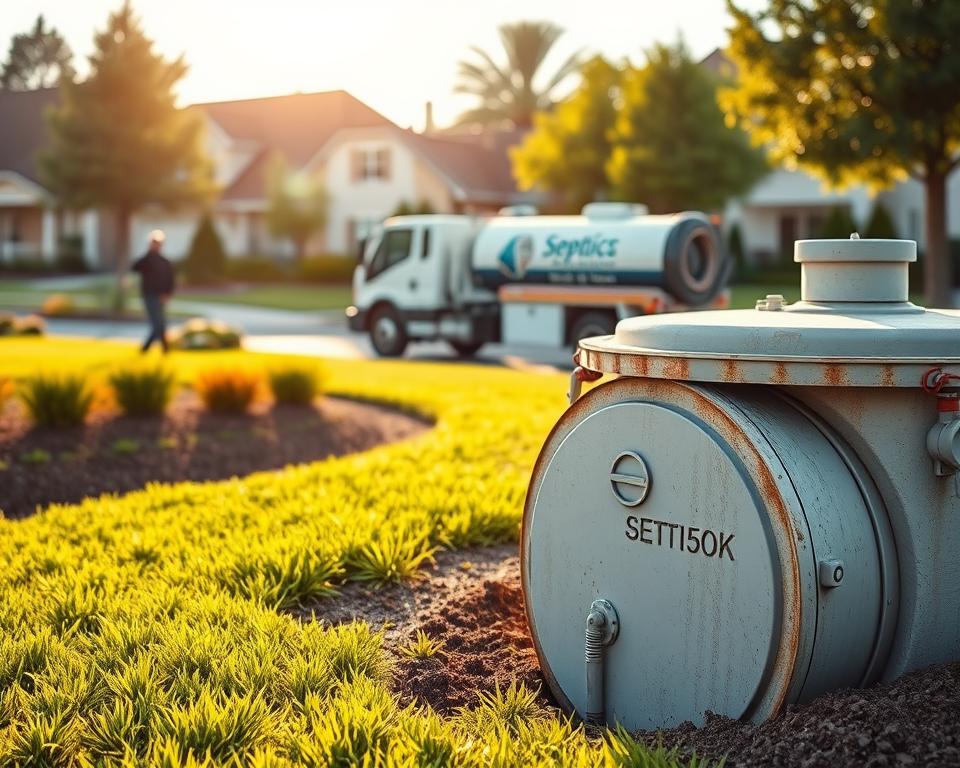Crucial Tips for Septic System Pumping
Do you ever think about how often you should schedule septic system pumping to avert costly breakdowns? With over 20 percent of U.S. households relying on septic systems, comprehending their maintenance is essential. Knowing precisely when to order a septic tank service is key to its longevity. In addition, there are economical septic pumping services that deliver excellent functionality without overspending. Below, we outline essential upkeep tips helpful for every homeowner.
Major Findings
- Regular septic system pumping is essential for optimal performance.
- Spotting the signs that signal the necessity for service can prevent major issues.
- Selecting professional septic system pumpers guarantees top-quality maintenance.
- Budget-friendly septic pumping choices are within reach for homeowners.
- Regular inspections support maximum system performance.
Know How Your Septic System Works
A septic system plays a key role in managing household wastewater, made up of several integral components that work in unison. The main drain line carries wastewater from your home to the septic tank, where the process starts. In the tank, an underground chamber, solids sink at the bottom, and bacteria digest these solids, processing the waste efficiently.
The processed liquid discharge then flows from the septic tank to the distribution box, where it is dispersed evenly across the drain field or leach field. Here, the soil extends the filtration, additionally purify the wastewater. Grasping the functions of these septic system parts is essential. It enables homeowners to monitor and upkeep their systems properly.
Understanding how your septic system operates helps you implement proactive maintenance measures. It’s wise to have scheduled check-ins with professional service providers of septic systems – septic tank pumping service near me. They offer crucial insights for best performance of your system. These professionals assist in scheduling the required pump-outs and checks. This attentiveness can significantly prolong your septic system’s lifespan.
The Value of Septic System Care
Caring for your septic tank consistently is critical for homeowners who want their system to remain reliable. A well-cared-for system delivers peace of mind and safeguards your property’s value. Without adequate care, you’re risking system breakdowns and health dangers.
Choosing a first-rate septic pumping service is crucial. They deliver timely inspections and pump-outs, clearing out sludge and scum buildup. If maintenance is neglected, urgent pumping may be required, which is expensive.
Sticking to a steady maintenance plan is smart. It includes professional evaluations and regular pumping. This proactive measure helps avoid urgent issues, providing a more secure living environment for everyone.

Warning Signs for Septic Systems
Being alert to septic system issues can prevent expensive repairs and major damage. Typical signs indicate when your system demands a check. These consist of:
- Slow drains throughout the house
- Pooling water in the yard above the drain field
- Foul odors near the septic tank or leach field
- Exceptionally thick grass growth in specific areas of your yard
These clues could signify problems that might cause your system failing. Prompt action is vital. Reaching out to septic pumping experts for an inspection aids. Early intervention stops initial issues from growing into serious ones. Additionally, routine upkeep guarantees your system operates well and remains durable.
Septic System Pumping: Best Practices
Correct pumping of your septic tank is essential to avoid expensive clogs and backups. It’s vital to establish the right interval for maintenance. Homeowners should typically schedule pumping every 2 to 5 years, based on the tank’s size and household wastewater levels. Heavy use of garbage disposals may demand more frequent pumping.
Engaging qualified pumpers means your tank gets a complete clean and check-up. During pumping, specialists look for any issues, such as broken baffles. Detecting these problems early heads off larger expenses and inconveniences later. Scheduled pumping schedules and expert help secure your septic system’s smooth operation.
Routine Inspections for Optimal Performance
Routine inspections are essential for your septic system’s effectiveness. Septic system inspections highlight minor issues before they worsen. Experts advise inspections every three to five years, influenced by system size and household usage. This sidesteps expensive fixes.
Holding maintenance records is important for tracking your system’s condition. These records offer insights into previous inspections, repairs, and when to schedule septic tank cleaning services. With this information, organizing for future upkeep becomes more straightforward, maintaining septic systems in excellent shape.
Regular inspections and detailed record-keeping not only enhance system efficiency but also lengthen its life. This approach protects the environment and the investment in a safe, operational home.
| Inspection Type | Recommendation Frequency | Benefits |
|---|---|---|
| Visual Inspection | Annually | Identify surface issues |
| Professional Inspection | Every 3–5 years | Assess functionality and detect problems |
| Septic Tank Pumping | Every 3–6 years | Prevent overflow and system failure |
Efficient Water Usage to Extend Septic Life
Smart water use is crucial for keeping your septic system healthy. It not only aids the environment but also boosts the performance of your home’s plumbing. By adopting easy, yet effective, conservation methods, homeowners can decrease wastewater.
Spread out your laundry activities over the week instead of doing them all at once. This enables the septic system to process water better and avoids tank overflow. Installing low-flow fixtures in your kitchens and bathrooms leads to considerable water savings, maintaining the water pressure up while lowering the flow rate, thus diminishing the amount of wastewater produced each day.
Promptly fixing leaks is another way to assist your septic system. Even a small leak can result in a large waste of water, stressing the septic system. Through regular inspections and repairs, you greatly aid the system’s efficiency.
Emphasizing water conservation isn’t just advantageous for your septic system; it’s also a step towards sustainable living. Making such practices a part of your lifestyle helps both your household and the planet.
Best Practices for Household Waste Disposal
Homeowners hold a vital role in keeping their septic system’s health by handling household waste appropriately. It’s critical to avoid throwing away non-biodegradable items like wipes, plastics, and other hazardous products in the system. These items can cause clogs, resulting in costly repairs and a drop in efficiency.
Composting food scraps and organic materials is a advantageous alternative to throwing them in the trash. This practice greatly lowers the amount of solid waste entering the septic tank. Focusing on biodegradable waste disposal preserves the ecological balance needed for effective waste management.
It’s essential to monitor what goes down the drains. Non-decomposable items can necessitate more frequent septic tank pumping. By learning and following correct waste disposal methods, you can secure a more efficient and long-lasting septic system.
Choosing Septic-Friendly Cleaners
The health of your septic system depends significantly on your choice of cleaning products. Selecting septic-safe cleaning products is crucial. These products protect the balance of beneficial bacteria that decompose waste. Many standard cleaners contain harmful chemicals that endanger this balance, causing pricey repairs or system failure.
Homeowners should try natural alternatives that are both powerful and environmentally friendly. Common household items like baking soda, vinegar, and lemon juice are excellent choices. These natural cleaners are not only good at cleaning but also encourage your septic system’s health.
Steering clear of products that contain antibacterial agents and chlorine bleach is important. Such substances destroy the essential good bacteria, compromising your system’s functionality. By choosing sustainable products, you secure both the efficiency and longevity of your septic system.
The Role of Bacteria in Your Septic System
Bacteria perform a key role in keeping your septic system efficient. They break down solids on their own and enhance nutrient processing. A lack of healthy bacteria can lead to system failure, creating costly repairs.
Homeowners can improve their system by adding organic additives. These products increase beneficial bacteria, making waste decomposition faster. It’s important to choose organic additives that are helpful, not harmful, to the septic environment.
A healthy bacterial community is crucial to a septic system’s longevity and efficiency. It stops solid buildup and cuts the need for regular pumping. Emphasizing bacterial health makes waste management more effective and eco-friendly.
Conclusion
Septic system care is crucial for the longevity and functionality of your home’s wastewater system. Adhering to essential maintenance tips avoids hefty repairs. Knowing routine pumping and inspections is key. This secures your septic system stays in excellent condition.
Becoming knowledgeable of your septic system’s operation and proper methods in water and waste management is important. Engaging professionals like All in Sanitation offers expertise. This supports your septic system’s long-term health and provides confidence.
Prioritizing proper septic maintenance today delivers future benefits. It shields your home and boosts your family’s quality of life. Emphasizing septic system care provides certainty with a well-maintained system.
